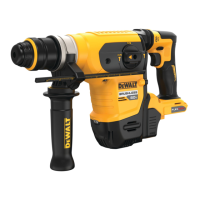9
ENGLISH
Belt Hook (Fig. E)
Optional Accessory
WARNING: To reduce the risk of serious personal
injury, ONLY use the tool’s belt hook to hang the
tool from a work belt. DO NOT use the belt hook
for tethering or securing the tool to a person or object
during use. DO NOT suspend tool overhead or suspend
objects from the belthook.
WARNING: To reduce the risk of serious personal
injury, ensure the screw holding the belt hook issecure.
IMPORTANT: When attaching or replacing the belt hook,
only use the screw
19
that is provided with the belt hook. Be
sure to securely tighten thescrew.
To accommodate left‑ or right‑ handed users the belt
hook
18
can be attached to the tool using one of the
slots below the main handle on left or right side and using
the provided screw
19
installed on the underside of the
mainhandle.
If the belt hook is not desired at all, it can be removed from
thetool.
To Adjust the Depth Rod (Fig.D)
1. Push in and hold the depth rod release button
13
on the
sidehandle.
2. Move the depth rod
12
so the distance between the
end of the rod and the end of the bit equals the desired
drillingdepth.
3. Release the button to lock rod into position. When
drilling with the depth rod, stop when end of rod reaches
surface ofmaterial.
Bit and Bit Holder
WARNING: Burn Hazard. ALWAYS wear gloves when
changing bits. Accessible metal parts on the tool and
bits may get extremely hot during operation. Small bits
of broken material may damage barehands.
The hammerdrill can be fitted with different bits depending
on the desired application. Use sharp drill bitsonly.
Bit Recomendations
• For wood, use twist bits, spade bits, power auger bits or
holesaws.
• For metal, use high‑speed steel twist drill bits or
holesaws. Use a cutting lubricant when drilling metals.
The exceptions are cast iron and brass which should be
drilleddry.
• For masonry, such as brick, cement, cinder block, etc., use
carbide‑tipped bits rated for percussiondrilling.
Bit Holder (Fig.J)
NOTE: Special adapters are needed to use with straight
shank bits and hexagonal screwdriver bits.
To Insert a Drill Bit or Other Accessory:
1. Insert the shank of the SDS PLUS bit about 3/4" (19mm)
into toolholder
10
.
2. Push down and rotate bit until it locks in place. The bit
will be securelyheld.
3. To release bit, pull the sleeve
11
back and remove
thebit.
Side Handle (Fig.A, D)
WARNING: To reduce the risk of personal injury,
ALWAYS operate the tool with the side handle properly
installed. Failure to do so may result in the side handle
slipping during tool operation and subsequent loss of
control. Hold tool with both hands to maximizecontrol.
The side handle
6
clamps to the front of the gear case
and may be rotated 360˚ to permit right‑ or left‑hand use.
The side handle must be tightened sufficiently to resist the
twisting action of the tool if the accessory binds or stalls. Be
sure to grip the side handle at the far end to control the tool
during astall.
To loosen side handle, rotatecounterclockwise.
ASSEMBLY AND ADJUSTMENTS
WARNING: To reduce the risk of serious personal
injury, turn unit off and remove the battery pack
before making any adjustments or removing/
installing attachments or accessories. An
accidental start‑up can causeinjury.
Wall Mounting
Some DeWALT chargers are designed to be wall mountable
or to sit upright on a table or work surface. If wall mounting,
locate the charger within reach of an electrical outlet, and
away from a corner or other obstructions which may impede
air flow. Use the back of the charger as a template for the
location of the mounting screws on the wall. Mount the
charger securely using drywall screws (purchased separately)
at least 1” (25.4mm) long, with a screw head diameter of
0.28–0.35” (7–9mm), screwed into wood to an optimal
depth leaving approximately 7/32” (5.5 mm) of the screw
exposed. Align the slots on the back of the charger with the
exposed screws and fully engage them in theslots.
SAVE THESE INSTRUCTIONS FOR
FUTURE USE
battery pack in a warm environment such as in a metal
shed or an uninsulatedtrailer.
2. If the battery pack does not charge properly:
a. Check operation of receptacle by plugging in a lamp
or other appliance;
b. Check to see if receptacle is connected to a light
switch which turns power off when you turn out
the lights;
c. If charging problems persist, take the tool, battery
pack and charger to your local servicecenter.
3. You may charge a partially used pack whenever you
desire with no adverse effect on the batterypack.
Charger Cleaning Instructions
WARNING: Shock hazard. Disconnect the charger
from the AC outlet before cleaning. Dirt and grease
may be removed from the exterior of the charger using
a cloth or soft non‑metallic brush. Do not use water or
any cleaningsolutions.

